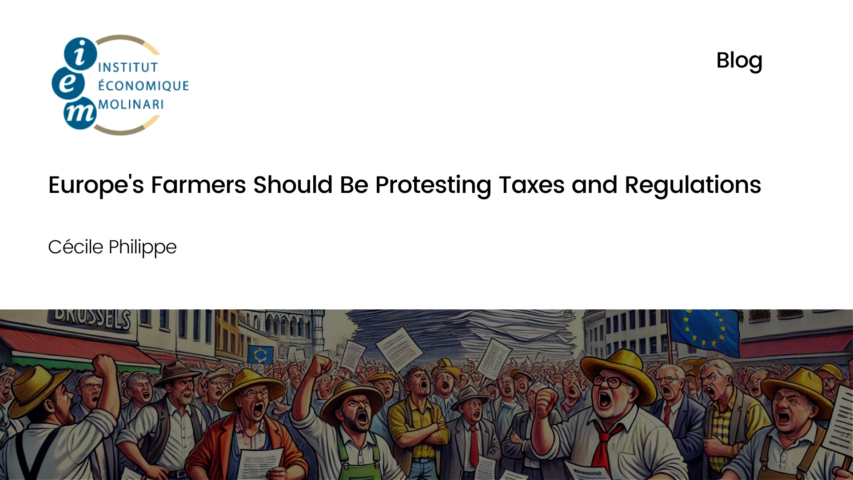Europe’s Farmers Should Be Protesting Taxes and Regulations

Europe's Farmers Should Be Protesting Taxes and Regulations
Cécile Philippe // 26 July 2024
It is significant that in France, farmers are angry about the Egalim laws. These complex laws aim to bring about a new sharing of value between farmers, manufacturers, and distributors.
But as is so often the case, this more egalitarian “sharing” is a smokescreen for insufficient value creation. If farmers are suffering, it is not by taking from manufacturers or distributors that the problem will be solved.
All economic players suffer from excessive taxes and regulations in a world open to competition.
A worse situation than their neighbours
Clearly, farmers have many reasons to be unhappy, given the extent of the regulations, bans, and controls they are subject to, particularly in the name of sometimes ill-conceived environmental measures. In fact, agricultural protests for these reasons are widespread throughout most of the EU. But some believe that, as beneficiaries of Common Agricultural Policy (CAP) subsidies, they are amply compensated for their obligations.
Things are not quite so simple. Indeed, French farmers may be worse off than competitors in neighbouring countries.
Eurostat provides data on the difference between what each EU member state receives as production subsidies and the production taxes borne by farmers. France, which accounts for 18% of agricultural production, receives 15% of subsidies net of tax, while Germany, which accounts for 12% of production, receives 14% of net subsidies.
Extraordinary taxation
Germany is certainly an expert at optimising European subsidies, but more importantly, France is a champion at taxing its producers. For every euro of subsidy received, French farmers pay 20 cents in production taxes, which reduces their subsidies compared to other European players.
But this situation does not just concern farmers. The entire production sector in France is subject to extraordinary taxation in the form of taxes on production and profits, amounting to 7.4% of added value, compared with 5.4% in the EU and 3.7% in Germany.
As a result, trying to alleviate the anger of farmers by worsening the situation of manufacturers or distributors is a zero-sum game that will only redistribute the anger of economic players differently.
Europe’s tax champion
French authorities have begun to reduce this excessive taxation that works against production, but they are too timid. In 2022, France remained the European champion in production taxation, with 39 billion euros levied on companies, compared with a total of 40 billion euros in production taxes net of subsidies in the EU.
VAT was invented by a Frenchman, Maurice Lauré, in 1954 to avoid the distorting effects of production taxes. Seventy years on, France has still not managed to get rid of this archaic tax system, even though it would not destabilise public finances, since the disappearance of production taxes would be offset by an increase in yield from other compulsory levies.
In the meantime, this is deeply destabilising for all economic players – including farmers – who are right to despair at the inertia of our politicians.
This blog was originally published on IEM's blog in French.
EPICENTER publications and contributions from our member think tanks are designed to promote the discussion of economic issues and the role of markets in solving economic and social problems. As with all EPICENTER publications, the views expressed here are those of the author and not EPICENTER or its member think tanks (which have no corporate view).



